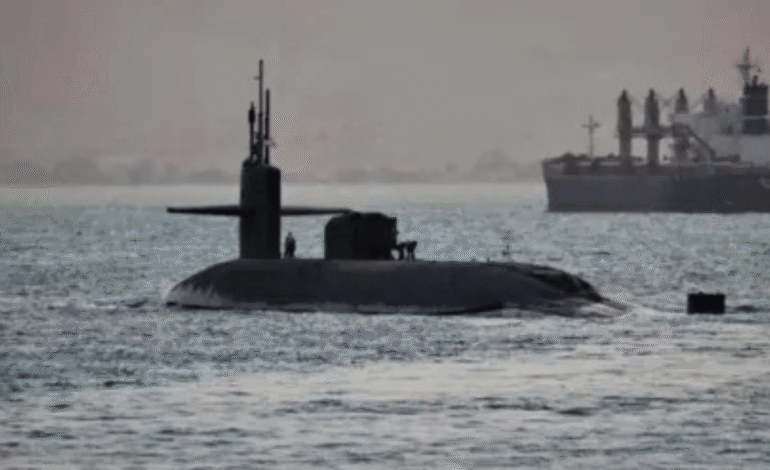India Approves Major Indo-German Deal To Build Six Advanced Submarines

India has taken a very important step to strengthen its naval power by approving talks for building six new advanced submarines under Project 75 India. This deal, worth more than Rs 70,000 crore, will be done in partnership with Germany’s ThyssenKrupp Marine Systems (TKMS). The decision comes after months of delay and is being seen as a major boost for India’s defense and security, especially in the Indian Ocean region where naval strength plays a crucial role.
The new submarines will come with Air Independent Propulsion (AIP) technology, which will allow them to stay underwater for nearly three weeks without surfacing. This is a big advantage, as it will make them more powerful, stealthy, and capable of handling threats in the region.
Project 75 India: A Long-Awaited Defence Push
Project 75 India is not new. It has been part of India’s defense plans for many years, aimed at building powerful submarines inside the country with help from global technology partners. India has already completed the first stage of this project by building six Scorpene-class submarines at Mazagon Dock Shipbuilders Limited (MDL) in Mumbai with French collaboration.
The new stage, now cleared by the government, focuses on building six more submarines, but this time with German design and technology support. These submarines will be built in India, showing the government’s commitment to ‘Make in India’ and self-reliance in defense production.
Why India Needs More Submarines
The Indian Navy currently has about 16 conventional submarines and one nuclear-powered submarine. Out of these, many are more than two decades old. Experts have warned that India needs at least 24 modern submarines to secure its long coastline and keep watch over the Indian Ocean, which is one of the most important sea routes for global trade.
At the same time, countries like China and Pakistan are modernizing their fleets very quickly. China already has a strong presence in the Indian Ocean, and Pakistan is buying modern submarines from China. This makes it very important for India to expand and upgrade its submarine fleet to stay ahead in the region.
The Role of Germany in the Deal
Germany’s ThyssenKrupp Marine Systems is one of the world’s top submarine makers. It has a long history of building powerful and reliable submarines used by many countries. Under this deal, Germany will share its advanced technology and design, while MDL in Mumbai will handle construction in India.
This joint work will not only give India modern submarines but also help transfer technology and skills to Indian engineers and workers. It is expected that over time, India will become more self-reliant and capable of producing even more advanced submarines on its own.
Advanced Technology: The AIP System
The highlight of these new submarines is the Air Independent Propulsion (AIP) system. Normally, submarines need to come to the surface frequently to recharge their batteries using diesel engines. But with AIP technology, the submarines can stay underwater for two to three weeks without surfacing.
This makes them very hard to detect by enemy ships, aircraft, or satellites. It also gives them a big advantage in stealth operations, patrolling, and even combat situations. The AIP system is considered one of the most important technologies for the future of underwater warfare, and India will benefit greatly from having it.
How the Deal Will Be Finalized
According to defense officials, talks between the Indian defense ministry, MDL, and Germany’s ThyssenKrupp will begin soon. The aim is to finish the negotiations within six months so that construction can start without more delays. Once signed, this will become one of the biggest defense projects between India and Germany.
The submarines will be built in India, with German support, over the next several years. This will also create jobs, skill development, and new opportunities in India’s defense industry.
Strategic Importance For India and the Region
This submarine deal is not just about defense equipment; it is also about India’s position in the Indian Ocean and beyond. The Indian Ocean is a very busy route, with huge amounts of oil, gas, and trade passing through it every day. Securing this region is vital for India’s economy and security.
With more advanced submarines, India will be able to patrol and protect its waters more effectively. It will also give India the strength to counter challenges from other naval powers in the region, especially China, which has been increasing its presence through its ‘string of pearls’ bases strategy.
Indo-German Defence Cooperation: Growing Stronger
The submarine deal is also a sign of growing defense cooperation between India and Germany. In recent years, both countries have been working closely not only in defense but also in areas like trade, green energy, and technology. Germany sees India as a key partner in Asia, and India sees Germany as a trusted partner in Europe.
This deal will further strengthen political, economic, and defense ties between the two nations. It also shows that global powers are ready to support India’s role as a rising defense and security leader in the Indo-Pacific region.
Challenges Ahead for Project 75 India
While the approval is a big step, there are still challenges ahead. Submarine building is a very complex process, requiring advanced skills, infrastructure, and high-quality technology. There are chances of delays, cost overruns, or technical difficulties.
India’s defense sector has faced such issues in the past, with projects taking longer than expected. However, experts believe that with strong government support, international cooperation, and clear deadlines, these challenges can be managed.
The Future of India’s Submarine Fleet
Once completed, these six submarines will give India one of the most powerful conventional submarine fleets in the region. Along with the nuclear submarines being built under a separate program, India will have a balanced and modern underwater fleet.
This is important not just for defense but also for India’s ambition to become a major global maritime power. A strong Navy backed by modern submarines will allow India to play a larger role in regional security, international missions, and humanitarian operations at sea.
A Turning Point for Indian Naval Power
The approval of talks for the Rs 70,000 crore Indo-German submarine deal under Project 75 India marks a turning point for India’s naval strength. It brings advanced technology, strong partnerships, and a big step toward self-reliance in defense.
For India, this is more than just buying submarines. It is about building a secure future, protecting its interests, and showing leadership in the Indo-Pacific.








1 Comment
[…] India is preparing to welcome Starlink, the satellite-based internet service from Elon Musk’s SpaceX. The government has approved the company’s entry into the Indian market after Starlink agreed to follow strict security and data rules. This decision marks a big step toward improving internet access in remote and rural areas of the country. […]
Comments are closed.